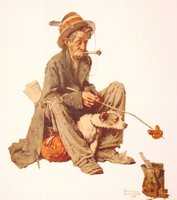
The origin of The Hobo can be traced back to ancient Mesopotamia, or “The Hobo Bindle Of Civilization”. In the fertile lands nestled between the Tigress and Euphrates rivers, the first Hobos came to prominence, hopping aboard small fisher boats for transport, sometimes going unnoticed for days until they jumped off at their sought destination, usually a few hundred yards downstream.
Fast forward a hundred years or so, when the Great Depression hit America, and untold googles of dollars were lost overnight, most likely to the vengeful ghost of J.P. Morgan. When the stock market fell, The Hobos were largely unscathed; they already owned very little, and what they did own was unaffected by the crash, unlike the industries of cattle or grain or smiles. No, The Hobos did not deal in these things; the commodities they traded were usually to other Hobos, who would gladly barter an unbroken wishbone, The Hobos' favorite kind of bone, for a length of yarn, which, despite all evidence to the contrary, The Hobos thought to be unbreakable and self-aware.
In the days following the sharp economic downturn of the once-prosperous US of A, thousands of men and tens of women across the country left their lives, now in sharp, splintery shambles, behind in order to pursue the hard-knock, rough-and-tumble, dirt-and-polio life of The Wandering Folk whom had now been lifted up as folk heroes and deities in light of the squalor that now faced America. Now, The Hobo Life made sense; now, it was mandatory.
Stay tuned for the next installment in the The Tyler Effect exclusive series, On Hobos, whenever I get around to it.